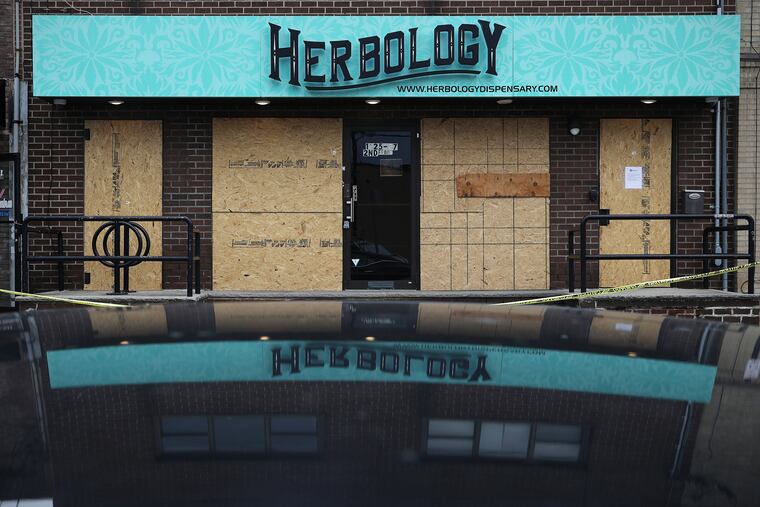Philly marijuana dispensaries that got looted say state rules are making it harder to reopen
Seven city cannabis dispensaries incurred serious damage when protests over the killing of George Floyd by a Minneapolis police officer were accompanied by a weekend of looting.

Medical marijuana dispensaries in Philadelphia are rushing to repair damage caused by looters so they can reopen quickly and serve patients.
But some owners say the state’s Department of Health, which regulates the industry, is throwing up roadblocks as they try to enhance security measures at their dispensaries to prevent any further “targeted attacks.”
Seven city cannabis dispensaries incurred serious damage when protests over the killing of George Floyd by a Minneapolis police officer were accompanied by a weekend of looting. Collectively, dispensary owners estimate they suffered hundreds of thousands of dollars worth of damage. At least three of them will take weeks to reopen: Verilife in Manayunk, Beyond/Hello in Center City, and Herbology in South Philadelphia.
In two of the cases, looters were able to breach the vault where the dispensaries hold marijuana.
Thieves stole about $25,000 worth of cannabis products from the Verilife dispensary and wrecked the interior of the store. A small amount of cannabis was stolen from Beyond/Hello at 12th and Sansom Streets, but looters found $900 in cash and caused more than $100,000 of random damage to the facility, according to the owners.
Store owners said they want to ensure that this can’t happen again. However, putting in stronger doors and vaults with more reinforcement may be held up by state regulators.
One dispensary executive, who spoke on condition of anonymity because he feared reprisal from regulators, said all repairs must be done to the original specifications of materials used when the shops were first approved.
Bolstering security will require “a formal modification request, a $250 fee, and a 30-day review period to approve,” the executive said. "They’re not making it easy. It’s nuts. It has to be back to exactly the way it was or undergo a review period.”
A spokesman for the Department of Health acknowledged the cumbersome process but said staff would try to speed inspections.
“The reopening of operational sites is a top priority,” spokesman Nate Wardle said. “When a facility is prepared for our review it is given immediate attention.”
The Ethos dispensary on Locust Street was approved to reopen Monday after boarding up its windows and sweeping up broken glass left by two waves of looters. Liberty Dispensary in Northeast Philadelphia, where neighbors alerted police at the first hint of trouble, repaired broken windows and was operating as normal this week.
Only the Keystone Shops dispensary in South Philadelphia avoided a break-in attempt. Owner Mike Badey had posted armed men outside the Packer Avenue store, a former bank branch. Guards were also dispatched to the TerraVida dispensaries in the suburbs.
“We had several groups scoping us out over the weekend,” Badey said. “When they saw our multiple armed guards, they walked away. Up until that Saturday I believe there had been zero break-ins of dispensaries in the entire state. It was a bad week.”
Another of Badey’s stores, in King of Prussia, was temporarily closed when ferocious winds blew off its roof two days after the unrest.
Security guards are now stationed at Herbology on East Passyunk Avenue and Verilife.
“It was violent and it was targeted. I’ve reviewed the security video. It felt very personal,” said Ellen Kaminsky, general manager for Herbology, where thieves destroyed windows, doors, the building’s facade, and the security system. “We spend more time here than we do at home. It’s frightening and scary, but we’re going to come back better in no time.”
Patients may need to travel outside the city to find a dispensary to accommodate them, as medical marijuana can’t legally be sent through the mail, unlike traditional pharmaceuticals.
“Other than going out of town or trying to find a caregiver, I don’t know what they can do,” said Luke Shultz, a consumer advocate on the state’s medical marijuana advisory board. “They’re kind of stuck. Until the damage can be repaired it could take weeks or months to return to normal.”